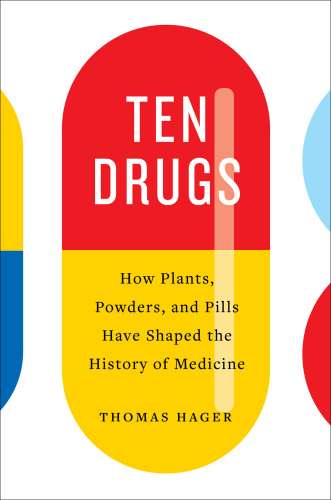
Ten Drugs
How Plants, Powders, and Pills Have Shaped the History of Medicine
چگونه گیاهان، پودرها و دانهها تاریخ پزشکی را تغییر دادهاند
کتاب های مرتبط
- اطلاعات
- نقد و بررسی
- دیدگاه کاربران
نقد و بررسی

Starred review from February 1, 2019
A history of significant drugs and their evolutions.Despite the title, the book contains 10 isolated chapters recounting the history of a score of important drugs. Readers will not miss the absence of an overarching theme because the stories are skillfully told and entirely entertaining. An award-winning writer on science and medicine, Hager (The Alchemy of Air: A Jewish Genius, a Doomed Tycoon, and the Scientific Discovery that Fed the World but Fueled the Rise of Hitler, 2008, etc.) devotes significant space to "the most important drug humans have ever found": opium. "Dried and eaten or smoked," writes the author, "it was early man's strongest, most soothing medicine. Today it is among the most controversial." Discovered in prehistoric times, it spread across the world. Its addictive property was no secret but considered only a modest drawback because, unlike alcohol, users of opium were rarely violent. By the end of the 19th century, its refined versions--morphine and, later, heroin--produced an addiction epidemic, the beginning of moral disapproval, and increasingly aggressive but ineffectual government efforts to suppress opiate misuse. The history of vaccines, mostly the story of smallpox eradication, is so satisfying that it deserves its chapter. Hager follows with exciting stories of discovery with an international reach--antibiotics in Germany, antipsychotics in France, cholesterol-lowering drugs in Japan--and plenty of unknown geniuses. Though not a muckraker, the author is no fan of drug companies, and he admits that new drugs are greeted with too much enthusiasm, unpleasant side effects invariably appear, and the juiciest pharmaceutical "low-hanging fruit" was plucked during a golden age that ended 50 years ago. New antibiotics cost at least 1,000 times more than old ones. Nowadays, lifesaving drugs attract less attention than those that improve the quality of life--e.g., Viagra, Botox, contraceptives, and tranquilizers.An expert, mostly feel-good book about modern medicine.
COPYRIGHT(2019) Kirkus Reviews, ALL RIGHTS RESERVED.

February 15, 2019
Throughout history, physicians, chemists, and observant mothers have discovered drugs serendipitously. Looking to cure specific diseases, they found treatments for different diseases or chronic conditions. Often, the medical community then resisted these new drugs, continuing with bleeding, doses of mercury, or other traditional treatments. In recent decades, research and testing have kept new drugs in development for years. Ironically, once the Food and Drug Administration approves drugs, pharmaceutical companies and physicians find uses other than those for which they were approved. In the wake of DNA mapping, the pharmaceutical industry is changing again. Biochemists are designing drugs, such as monoclonal antibodies, for very specific diseases. In profiling 10 drugs, Hager (The Alchemy of Air, 2008) shows that drug development generally benefits human health and longevity, but there are often side effects for patients and society. Especially troubling is the influence of profit-driven corporations and the inequality of health care. Written for general readers, Hager's book is entertaining, insightful, and recommended for all public libraries.(Reprinted with permission of Booklist, copyright 2019, American Library Association.)

























دیدگاه کاربران